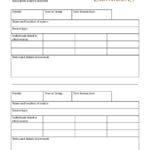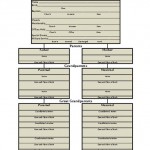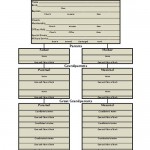If you are planning to head to the state or provincial archives to do research on your ancestors, it is important to plan ahead so that you will have the best chance of success while onsite.
Create a research plan
Before you go, take a look at the documents that you already have. This will prevent you spending time duplicating research already done
Think about what it is that you want to know. Write out your brick walls. Then list the places where you think you might be able to find answers. Do you need to look at newspapers? Land records? Trades directories?
Next do some online research to determine where you are likely to find the records that will help you fill in the gaps or chip away at your brick walls.
In your online research of the archival repositories
Learn not only what records they hold. Find out what days and times they are open.
Ask these additional questions: Are there requirements for researching? Do you need to book research time? Can you just walk in? Is assistance available should you require it? Are there requirements for obtaining a research pass or card? If so, will you require photo ID? Save time by taking this with you
What to take
Take a list of all of the documents that you already have. This will avoid wasting precious research time searching for documents that you don’t need.
Find out what are the hours that the archives are open. Are they open only on weekdays? Are they open all day or half day? Do they have evening hours? Are they closed certain days of the week?
You may want to see if you are allowed to have your laptop or tablet with you in the archives. Is there access to Wifi? Will you need to have your family tree information on your hard drive as opposed to it being stored on a cloud-based website in order to consult it as you research.
Many archival institutions have their holdings off-site and so it is important that you know this and order ahead so that your time can be well spent and disappointment minimized.
Will you need to call or write ahead in order to make sure the documents will be available while you are there?
Read up on whether you are allowed to photograph the images, scan the images, download or copy the images. Is there a fee to be able to do so? Do you need photo id? Do you need to register ahead in order to get a ticket, card or pass in order to be able to use the facilities?
Pencils are a must, pens are generally not allowed in archival repositories.
Plan the order in which to consult the records then decide if you need to visit more than one repository.
Safe travels!
Above all, relax and enjoy the journey on your genealogy road trip. Don’t try and cram too much in. Take time to read over the documents and see how the new information adds details to what you already know.
What questions are now answered? Have new questions surfaced? Think about how much knowledge you have gained about your ancestors, whether dates, places, people, events or just knowing where they were and when. It all adds to your understanding and deepens your connection to them.
Safe travels!
Scottish born, Canadian raised, Christine had the best of both worlds, growing up immersed in Scottish culture. Realizing that others of the Scots diaspora were not as fortunate, she started her business, Genealogy Tours of Scotland to allow others researching their Scottish roots the opportunity to return to the land of their ancestors, conduct family history research and deepen their sense of belonging to their ancestral kin.




